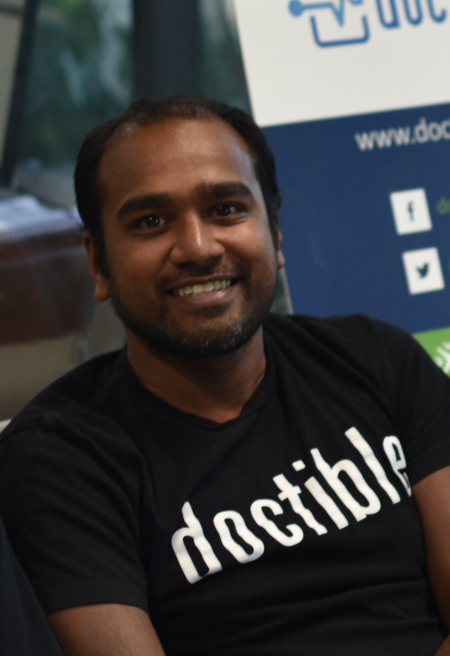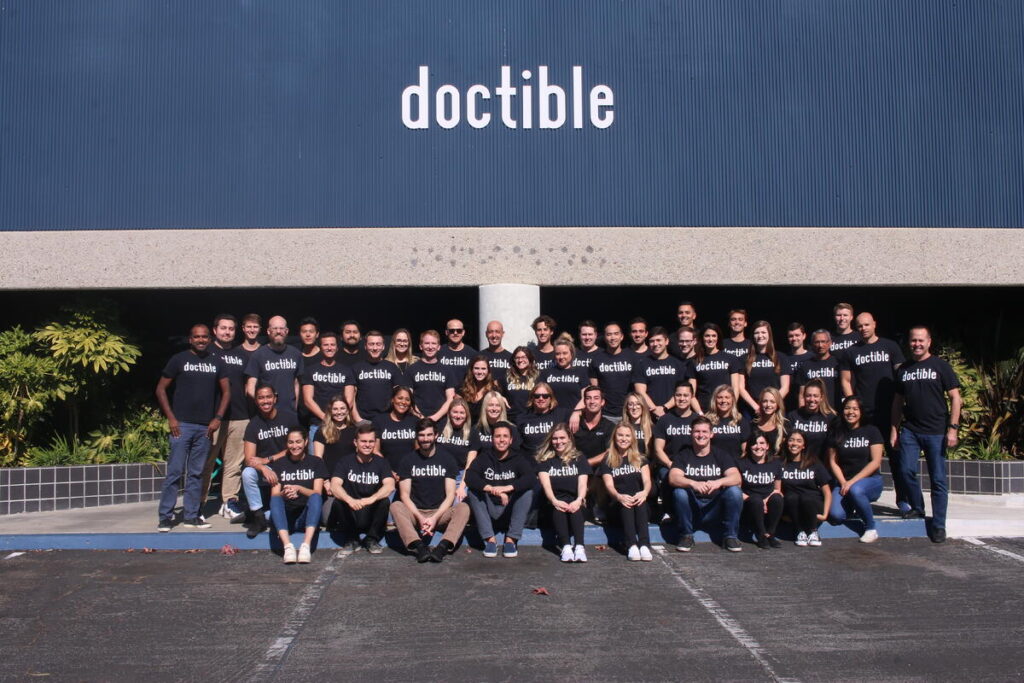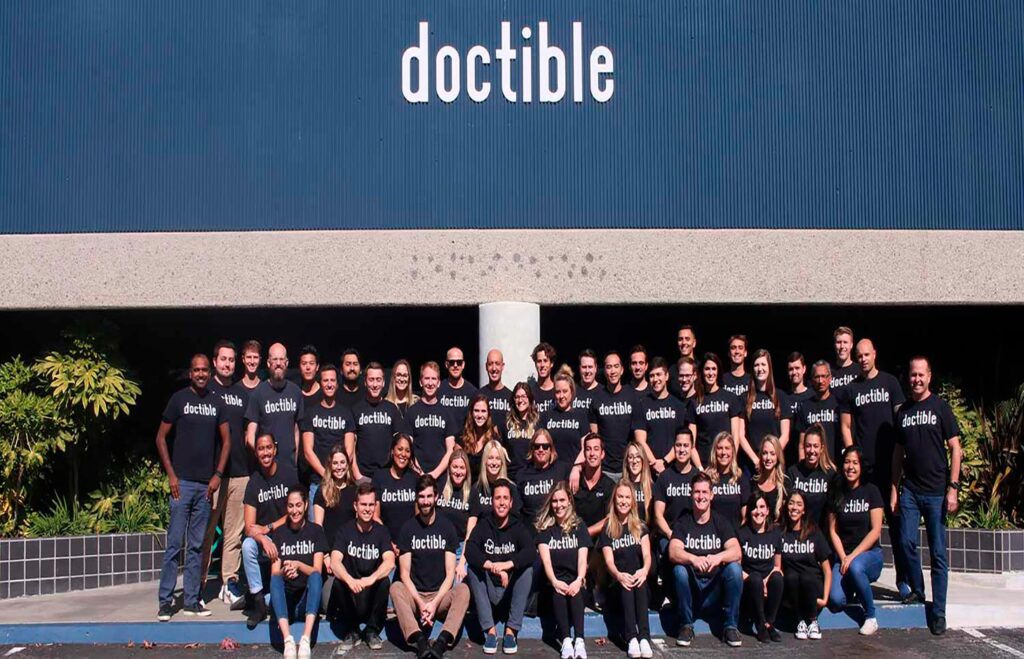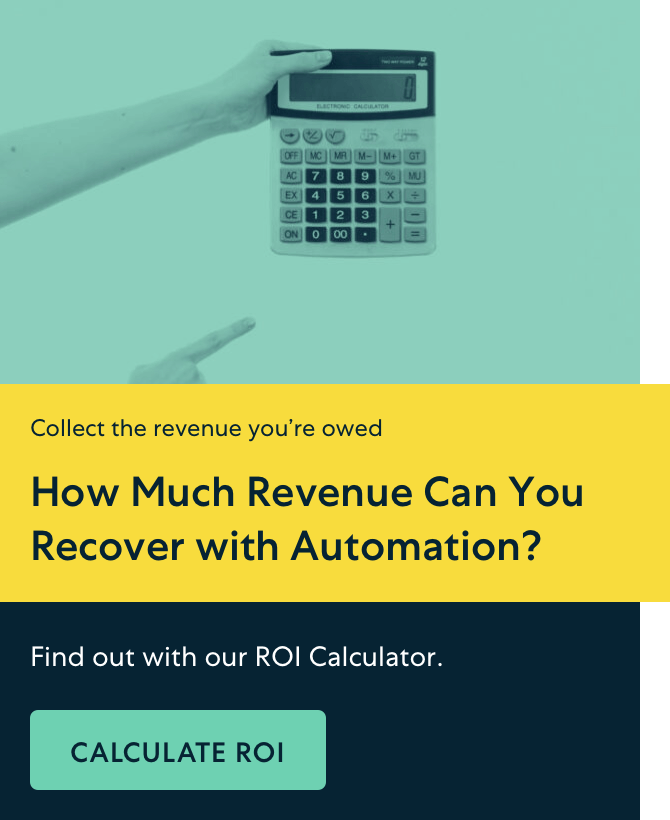SaaStr’s Jason Lemkin called $10M ARR the point of ‘inevitability’ in the SaaS world: “Once you hit this point, you have a brand, you have a fully baked team, you have a robust product, and you have a self-generating stream of new leads and new business.”
And for someone who has never started a business before, let alone scaled one, being in charge of a legitimate SaaS brand might seem equal parts exciting and intimidating. But intimidating doesn’t mean impossible.

Ajit Viswanathan is a first-time CEO and co-founder of Doctible, a patient relationship management platform built to help healthcare providers engage and communicate with their patients. And in seven years, he not only co-founded the business but scaled it to inevitability: $10M ARR.
Becoming a first-time SaaS CEO responsible for scaling a business to such heights could be compared to skydiving: no amount of training beforehand can fully prepare you for the real thing. It’s one of those things you can only truly learn by doing.
Unsurprisingly, Doctible’s journey to $10M was also a learning journey for Viswanathan. He sat down with me to share a few of those lessons.
1. Let the market guide you
In the beginning, Doctible wasn’t meant to be a SaaS product at all, but a marketplace for patients to shop for healthcare services according to prices posted by the doctors themselves.
“In a previous life, I was working in a company which had a peripheral attachment to healthcare,” explains Viswanathan, “so I saw how healthcare transparency was actually pretty opaque. We felt we could come into the market with a better approach to providing price transparency, showing patients how much it would cost prior to going into their appointment.”
But as Viswanathan and his co-founder began working on the concept in 2013, they found that, while it was still an important topic to address, capital requirements and healthcare system restrictions meant such a marketplace wouldn’t be a viable product to move forward with at the time.
Rather than abandoning the idea altogether, they turned to their customers for inspiration on how to evolve it.
What they learned was that many medical and dental practices were having problems around efficiency and patient attraction and retention. So, they experimented with turning Doctible into a patient relationship management platform and by mid-2016, decided to focus all their efforts on the SaaS component, making it the product it is today.
2. Your priorities will shift as your business scales
Just because a certain process or mindset helped you get to where you are today, it won’t necessarily help you get to where you want to be tomorrow. For a business to scale, Viswanathan recommends first-time CEOs be prepared to change their focus and priorities at key points through the journey.
“The path to $10 million is going to be an evolution of the role from a founder to a CEO,” he notes.
He suggests the evolution might happen in stages along with ARR growth.
- The first stage can be frustrating for a first-time CEO, figuring things out as you go and working toward that $100K ARR mark. At this time, you probably don’t have any funding or a team, so the role is very hands-on.
- As you approach the $1M ARR milestone, it’s time to start getting more strategic. This is the point where you may be bringing investors on board, and they’ll want to see that you have a plan in place for taking the business to the next level.
- Then, working toward $5M, your role becomes increasingly more strategic. You’ll have to make a lot of key hires, adding additional layers to your org chart.
Viswanathan admits the third phase was surprisingly difficult. “It’s always going to be a struggle because a founder grew up in the stage where they were able to do everything. It’s a challenge to delegate and not pay attention to certain things.”
But going from $5M to $10M is where a bigger shift happens.
“Initially, everybody’s all about growth. And then you realize: on the journey from $5M to $10M, growth is important, but churn becomes an obsession,” says Viswanathan.
3. Not everything will go as planned, and that’s okay
As a first-time entrepreneur, Viswanathan didn’t have the luxury of experience, and admits he made his fair share of mistakes in the beginning.
“I think that’s one thing that we struggle with—sometimes you don’t want to admit to a mistake. It’s not pleasant, it’s not easy, but moving past it as soon as you can is probably one of the biggest things,” he says.
Viswanathan believes mistakes and setbacks were important for him to go through in order to grow as a CEO.
Doctible didn’t raise as much capital as it wanted to right off the bat. In fact, 18 months into the journey, the business was unable to raise its first round of funding. So, the team had to adopt the level of discipline of a bootstrapped organization.
And though Doctible has since raised venture capital to the tune of $4.6M, the bootstrapped mentality remains. This allowed the business to scale to $10M ARR with minimal investment while competitors were raising $20M-$30M rounds to achieve the same outcome.
Reflecting on that chapter of Doctible, Viswanathan admits it may have been for the best in the long run. “If we had gotten seed funding within our first three months of launch, it would have actually been a deterrent for our growth. We would have probably gotten too comfortable if things were too easy.”
His advice for other first-time CEOs dealing with setbacks? Surround yourself with a good circle of other CEOs you can bounce ideas off, and that can help you work to rectify any mistakes you might make.

4. Company culture is a contributor to business growth
Every business has its set of core values. For Viswanathan, it was important that Doctible did more than simply talk about them.
“For us, core values are really about how we operate—what are the things that I need to be held accountable to, and what are the things we would hold our employees accountable to? We try to live those values,” he says.
Company culture will naturally evolve as a business scales—any business will be a different environment when it has ten employees than when it has 60. But Viswanathan believes the core values should remain the foundation regardless of the business’s size.
In the beginning, he was on the floor working directly with his team. But as Doctible grew, he began to rely a bit more on his team leaders to ensure those values are being enforced.
Doctible makes use of employee NPS surveys to ensure its team is happy. And while, like in any business, there have been instances where those scores have dropped, the leadership team makes it a priority to find out why so they can address it.
In fact, Viswanathan knows employee happiness can be a key contributor to the overall success of the business.
“We want to bring our employees into an environment where they can see growth, they can learn, they get to have fun, and they get to expand on their skillset. And if we can accomplish that and the company grows, then we’re in a position where both parties consider it as a win-win,” he says. “Watching our employees grow is a very big part of the puzzle for us.”
Success is more than just numbers for this first-time CEO
First-time CEO Viswanathan evolved Doctible from an idea to a marketplace to a successful SaaS platform that currently reaches millions of patients each month.
“Not to make things morbid, but it never gets easier,” he laughs. “It’s going to be harder going from $5M to $10M than it was from $1M to $5M. If everything in my identity was tied to hitting a certain number, it would have been extremely hard. You’ll never be happy.”
The MRR or ARR milestones will come eventually. Rather than hyper-focusing on how quickly you’re achieving them, Viswanathan advises first-time CEOs to look for other ways they’re making an impact. For him, that’s
- watching his employees grow and advance in their careers with the business and
- helping healthcare providers to better connect with their patients.
But for a first-time founder and CEO, achieving any outcome—financial or otherwise—first involves taking a leap of faith.





